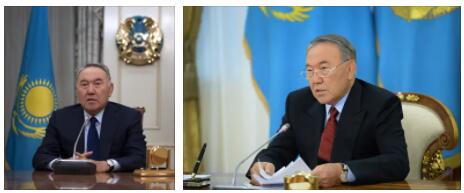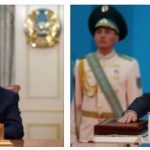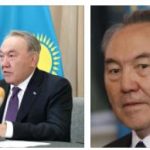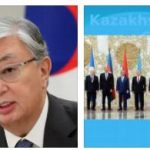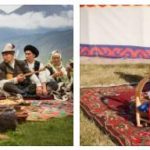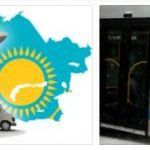The successor
In his resignation speech, Nursultan Nazarbayev announced that the previous chairman of the Senate, Kasym-Dschomart Tokayev, would be his successor until the end of his regular term in 2020. The swearing-in took place on March 20, 2019.
Tokayev, born on May 17th, 1953 in Alma-Ata, is an experienced, level-headed politician from the immediate circle of the first president. He gained his first experience in foreign policy while still in the Soviet Union. In independent Kazakhstan, he was Prime Minister from 1999-2002 and held the post of Foreign Minister twice (1994-1999; 2003-2007). Since 2007 he has been chairman of the upper chamber of parliament, the Senate, with interruptions.
On April 9, 2019, Tokayev announced unexpectedly early elections for June 9, 2019. As expected, the ruling Nur-Otan party nominated him as their and therefore most promising candidate. Even during the short election campaign, there were signs that the population of the country’s major cities was no longer prepared, as was the case with Nazarbayev, to accept restrictions on freedom and fairness in elections without contradiction; they culminated on election day when thousands took to the streets and police responded with mass arrests. The election as such, however, proceeded undisturbed, both the turnout (77.5%) and, above all, the result for the incumbent president, were unusual for Kazakhstan: Tokayev, who had to prevail against six other candidates, only received 70.96% of the vote, in the capital its share was only 59%. Even after the inauguration, there were protests in the streets, but they gradually subsided. The President has taken measures to improve the socio-economic situation of the population. However, he apparently rejects decisive political reforms. The year in office had presented Tokayev with greater challenges than expected, the second even surpassed them. His answers don’t seem very convincing to observers.
It is currently not clear to what extent Tokayev can act independently at all, for example his critical remarks about urban planning problems in Nur-Sultan and the construction freeze he ordered for the controversial ski resort Kok Zhailau south of Almaty, first attempts at emancipation from his overpowering predecessor and mentor Nazarbayev are. The dismissal of Dariga Nazarbayeva from the post of the Speaker of the Senate in May 2020, again as a “free floating” trial Tokajews interpreted. But it is quite possible that the personnel decision is made in consultation with her father fell who disliked the above-mentioned public financial transactions of his daughter’s family.
Parties
According to computergees, in the first two decades after independence, Kazakhstan’s party structure was subject to many changes as a result of various new foundations, divisions and mergers. Parties are less defined by their program than by their leaders. They cannot therefore be classified in the familiar right-left scheme. The basis of the activity is the state registration, which is not secure and has already been revoked in some cases.
Seven parties are currently allowed: Nur Otan (Light of the Fatherland), presidential party, 84 seats in parliament; Ak Schol (Heller Weg), represented in parliament with seven seats; Kommunisticheskaja Narodnaja Partija Kazakhstana (Communist People’s Party of Kazakhstan) also has seven parliamentary seats. Not represented in parliament are: Asat; Birlik; Auyl (village), the party of the Patriots of Kazakhstan and the only party that can be assessed as moderately opposition, the OSDP. The Kommunisticheskaia partija Kazakhstana (Communist Party of Kazakhstan), which emerged from the Communist Party of the Soviet Union, was banned in early August 2015. The best-known, unregistered, regime-critical party, Alga (Forward), was banned from operating in 2012. Its chairman Vladimir Kozlov was sentenced to seven and a half years imprisonment (and released early in August 2016) in a highly controversial verdict for stirring up social unrest in early October 2012 (in the city of Shanaozen in December 2011). The DVK (Democratic Election of Kazakhstan) movement of the banker Muchtar Ablyazov, who has been living in exile for years, was declared a terrorist organization in March 2018 at the request of the Public Prosecutor’s Office – and thus apparently unintentionally the starting signal for a political revival opposition given in Kazakhstan – to which the state power reacts with the usual nervousness.
After the MPs had asked the President to dissolve the parliament elected in 2012 and to have new elections, these took place, like the previous ones, on March 20, 2016, almost a year earlier. Six of the seven registered parties took part, Asat waived from the outset due to a lack of prospects of success. As expected, the presidential party was again the strongest party with 82.2% of the votes, and the two other parties represented in the previous parliament (Ak Schol, Communist People’s Party) were able to jump the 7% hurdle. The other parties were below 2%. Like all elections in Kazakhstan so far, this one was also organized by the OSCE / ODIHR critically assessed. In particular, it was criticized that there were no real political alternatives for the voters. The level of voter turnout (77.12%) was also questioned and irregularities in voting and counting were criticized. Around 60% of the new members are seated in the new parliament, but no new behavior (discussions and criticism) is to be expected from them. A powerful extra-parliamentary opposition is not only prevented by registration regulations and security forces, but also by weaknesses of the opposition forces themselves.
